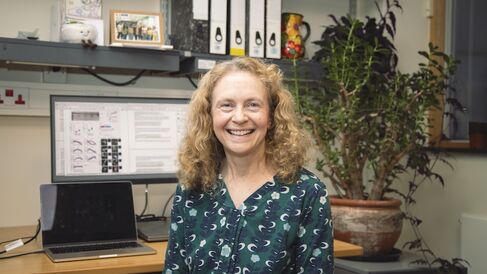Laura Machesky

Cell migration, actin dynamics and cancer metastasis
Cell migration allows the shaping of complex tissues during development, the homing of immune cells and also the escape of cancer cells from a tumour during metastasis. During their journeys, cells encounter environments of varying stiffness, texture and composition. They respond to environmental forces with changes in shape, adhesion and signaling. Tumours create stressful environments, imposing challenges of starvation, pressure and physical barriers on cells that require plastic adaptive behaviour. Tumours frequently are stiffer than normal tissues due to fibrotic extracellular matrix and compression forces due to their rapid growth. Cancer metastasis remains the most deadly aspect of solid tumours and the most intractable.
We are interested in how the extracellular environment shapes the responses of cells and drives activities such as migration, extracellular matrix remodeling and energy flux. We recently discovered that pancreatic cancer cells can sense the stiffness of their environment and respond not only with changes in migration, but also with metabolic adaptations that fuel enhanced invasiveness. This led us to hypothesise that cells couple their metabolic machinery to their cytoskeletons to optimise energy flow during stressful energy-consuming activities, such as invasion of extracellular matrix. Cells can also repurpose their actin cytoskeletons to take up nutrients via macropinocytosis and phagocytosis and thus address energy shortages. We study how cells make decisions about whether to use their cytoskeleton to eat or to walk and thus how they achieve plasticity to survive various environmental challenges.
Research Objectives:
- Understand how cancer cells adapt their cytoskeletons and energy flux when they invade in complex 3-dimensional environments
- Understand how the cytoskeleton and the cellular metabolic machinery crosstalk to fuel cell migration and invasion
- Uncover mechanisms behind cellular decisions to purpose actin dynamics toward migration vs nutrient uptake by macropinocytosis
- Use bioengineering to create complex, yet precisely controlled, environments that mimic in vivo conditions
Key Publications:
Le AH, Yelland T, Paul NR, Fort L, Nikolaou S, Ismail S, Machesky LM. CYRI-A limits invasive migration through macropinosome formation and integrin uptake regulation. J Cell Biol. 2021 Sep 6;220(9):e202012114. doi:10.1083/jcb.202012114.
Yelland T@, Le AH@, Nikolaou S, Insall R, Machesky L*, Ismail S*. Structural Basis of CYRI-B Direct Competition with Scar/WAVE Complex for Rac1. Structure. 2020 Nov 17:S0969-2126(20)30415-9.*co-corresponding @co-first
Papalazarou, V, Zhang, T., Paul, N.R., Juin, A., Cantini, M., Maddocks, O.D.K., Salmeron-Sanchez, M. and Machesky, L.M. The creatine-phosphagen system is mechanoresponsive in pancreatic adenocarcinoma and fuels invasion and metastasis. Nature Metabolism, 2020 Jan;2(1):62-80.
Lucendo-Villarin B, Meseguer-Ripolles J, Drew J, Fischer L, Ma E, Flint O, Simpson KJ, Machesky LM, Mountford JC, Hay DC. Development of a cost-effective automated platform to produce human liver spheroids for basic and applied research. Biofabrication. 2020 Oct 28;13(1).
Juin A, Spence HJ, Martin KJ, McGhee E, Neilson M, Cutiongco MFA, Gadegaard N, Mackay G, Fort L, Lilla S, Kalna G, Thomason P, Koh YWH, Norman JC, Insall RH, Machesky LM. N-WASP Control of LPAR1 Trafficking Establishes Response to Self-Generated LPA Gradients to Promote Pancreatic Cancer Cell Metastasis. Dev Cell. 2019 Nov 18;51(4):431-445.
Fort L@, Batista JM@, Thomason PA, Spence HJ, Whitelaw JA, Tweedy L, Greaves J, Martin KJ, Anderson KI, Brown P, Lilla S, Neilson MP, Tafelmeyer P, Zanivan S, Ismail S, Bryant DM,Tomkinson NCO, Chamberlain LH, Mastick GS, Insall RH*, Machesky LM* Fam49/CYRI interacts with Rac1 and locally suppresses protrusions.Nat Cell Biol. 2018 Oct;20(10):1159-1171.@ co-first, *co-corresponding
